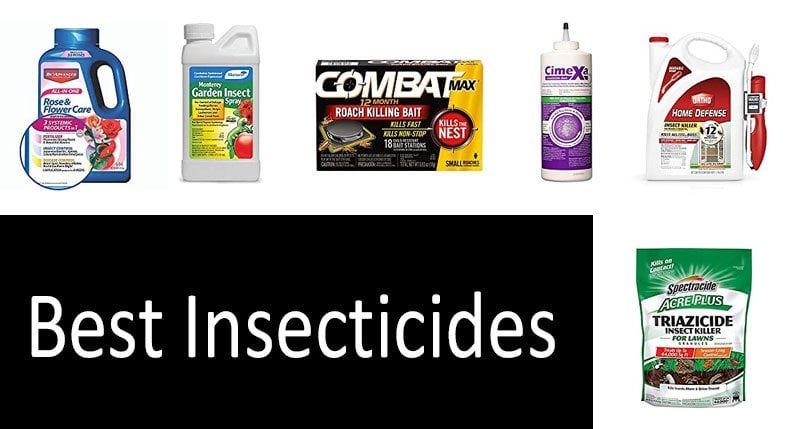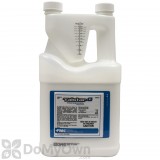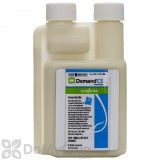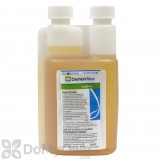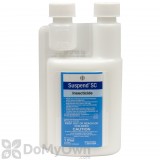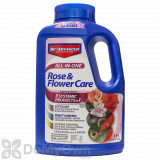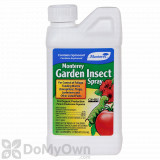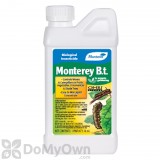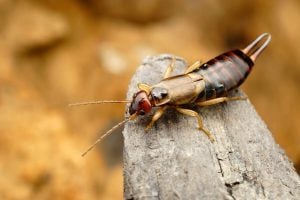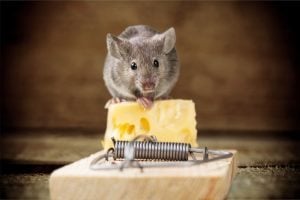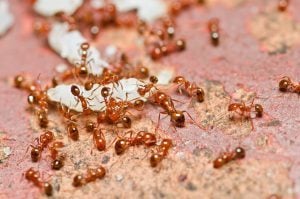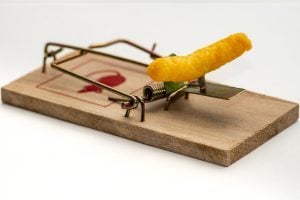What is the best insecticide? The answer largely depends on the species of insect you are going to control as well as environmental conditions. Some products are created for barrier treatment around buildings while others are safe to apply on edibles and ornamentals. For indoor use, choose ready-to-use solutions made with bifenthrin or deltamethrin. There are potent concentrates for quick pest knockdown or non-toxic solutions based on naturally occurring soil bacteria or insecticidal soaps.
If you deal with ants or cockroaches, consider baits containing fipronil or Borax as they successfully kill the entire colony. To get rid of bed bugs, use time-proven pyrethrins or low-toxic dusts like silica aerogel, which is a safe and effective solution often preferred by pest control professionals. When battling fleas, take a double approach: protect your pets with anti-flea sprays or collars and treat your yard and house with insecticides based on imidacloprid or permethrin.
What Are the Most Potent Multi-Use Insecticides?
There are 5 multi-use professional insecticides that are effective against over 30 types of insect pests and have a long-lasting effect and residue. These versatile insecticides are approved for a wide variety of uses including indoor and outdoor, residential, industrial, and institutional applications and even in food handling areas. Their high effectiveness has been proven by scientific research and multi-year use by pest control professionals. If you want to learn more about the effectiveness of these insecticides, read our reviews of Talstar insecticide , Tempo insecticide , Demon insecticide , Bifen insecticide.
Best Insecticides Compared
When dealing with professional-grade insecticides, it’s recommended to buy them at an online retail store specializing in pest control products, like www.domyown.com. They have a staff of professionals and can provide professional consulting in pest control, lawn, gardening product usage after purchase.
|
Talstar Pro 96 Ounce (3/4 Gallon) |
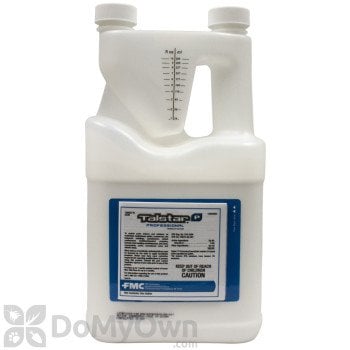 Check the current price |
|
Syngenta 73654 Demand CS Insecticide, 8oz |
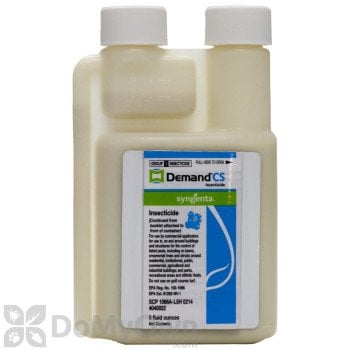 Check the current price |
|
Demon Max Insecticide Pint 25.3% Cypermethrin |
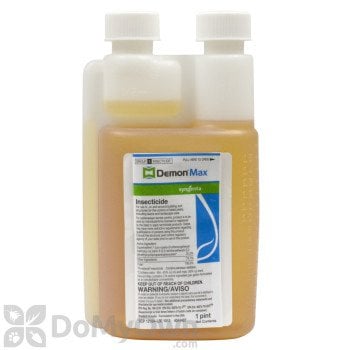 Check the current price |
|
Ortho 0220910 Home Defense Insect Killer |
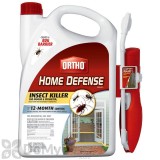 Check the current price |
|
Suspend Sc 16 oz. BA1007 |
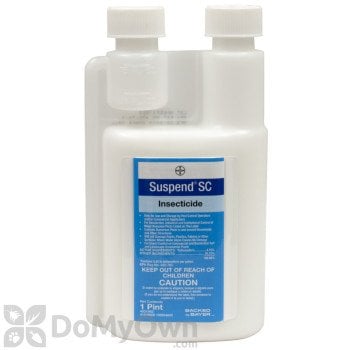 Check the current price |
|
Bayer Advanced 701110A All in One Rose Care Granules |
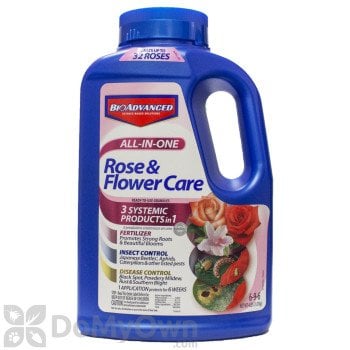 Check the current price |
|
Monterey LG6150 Garden Insect Spray |
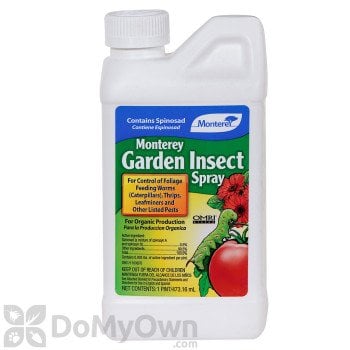 Check the current price |
|
Monterey LG 6336 Bacillus Thuringiensis (Bt) |
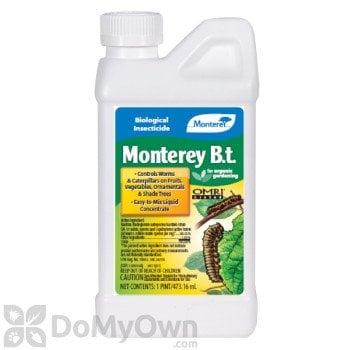 Check the current price |
{code 416}
Best Insecticide Reviews
Below, you will find a review of the best insecticides available on the market. Some of them are liquid insecticides that need to be diluted in the water while others are formulated as ready-to-use sprays or easy-to-apply granules.
Talstar Pro 96 ounce (3/4 gallon) | Best for Food-Handling Areas
The solution is based on 7.9% bifenthrin, a pyrethroid insecticide that influences the insect’s nervous system. The main benefit of using this product is the optimal balance between efficiency and safety. While being powerful, it can be safely used indoors, in food-handling areas, and around ornamentals.
Another reason for choosing the Talstar Pro is its versatility. The insecticide targets 75 most common pests, including cockroaches, fleas, ticks, mosquitoes, spiders, ants, mites, army worms, and many more. Additionally, the product is cost-efficient as one quart of the concentrate makes over 90 ready-to-use spray bottles.
Depending on the pest problem and weather conditions, the insecticide can last up to 3 months. It is indicative that more than 95% of buyers gave it five stars. They say it works and is very good at killing various species of ants. However, it is important to follow the label directions for the most accurate application.
Talstar Pro 96 Ounce (3/4 Gallon): Check the current price
Syngenta 73654 Demand CS Insecticide, 8oz | Best Long-Lasting
This product uses unique microcapsule technology providing long residual for up to three months. When an insect steps on the treated surface tiny microcapsules with insecticide adhere to its body. Not only does this help kill the insect by contact but it also allows spreading the insecticide to other insects.
Another benefit of this technology is long-lasting insect control. The microcapsules come in different sizes so that the smaller ones release the active ingredient immediately after application while the larger ones do it later. That is why the Syngenta Demand CS can remain effective weeks after the treatment. On top of that, these microcapsules are made with an outer shell resistant to heat, sunlight, and pressure.
The active ingredient is lambda-cyhalothrin, a synthetic insecticide mimicking the structure of naturally occurring pyrethrin. The advantage of lambda-cyhalothrin over natural pyrethrins is cost-efficiency and long-lasting insecticidal activity. The insecticide treats over three dozens of common pests, such as ticks, ants, and bed bugs.
Syngenta 73654 Demand CS Insecticide, 8oz: Check the current price
Demon Max Insecticide Pint 25.3% Cypermethrin | Best for Cracks & Crevices
This insecticide is ideal for spot treatment, particularly, cracks and crevices where many pest species tend to hide. The product contains cypermethrin at a high concentration and should be diluted at a ratio of 1.3 to 5.1 ounces per gallon of water. This compound is used in both large-scale agricultural applications and consumer-grade products. Cypermethrin is moderately toxic to humans but can kill beneficial insects, and therefore, should be handled with caution.
The Demon Max provides a quick knockdown, killing more than 30 different pest species. It is particularly effective in controlling subterranean termites. In addition to spot treatment, it can be used for perimeter application, injection treatment as well as applied directly to the soil and wood surfaces. Customers rate this product high. One of the buyers says that it has wiped out the entire colony of roaches, something that other insecticides failed to do.
Demon Max Insecticide Pint 25.3% Cypermethrin: Check the current price
Suspend Sc 16 oz. BA1007 | Best for Ornamentals
Made with the active ingredient deltamethrin, the insecticide can be applied to lawns, golf courses, ornamental gardens as well as cracks and crevices in the building. This compound belongs to pyrethroids, a man-made version of natural insecticides derived from flowers. Deltamethrin kills insects either on contact or through digestion and controls a variety of household and crop pests.
The insecticide comes in colorless micro-crystals that have a long-lasting effect, up to three months. Because of their chemical structure, micro-crystals are not absorbed by porous surfaces but rather remain on top of them. This allows insects to come into contact with the toxicant long after it was applied. The manufacturer recommends applying the product with an interval of every 21 days to completely eradicate the infestation. The concentration of deltamethrin is 4.75%, so you need to dilute it. The ratio ranges from 0.25 to 1.5 ounces per gallon of water, depending on the pest species. The ready-to-use solution will cover 1,000 square feet.
Suspend Sc 16 oz. BA1007: Check the current price
Bayer Advanced 701110A All in One Rose and Flower Care Granules | Best for Rose Bushes
If you grow roses, this solution is simply a “must” for you. The product contains both fungicide and insecticide, protecting your precious flowers from destructive insects and diseases. The first ingredient, 0.80% tebuconazole, is used in agricultural crops to control pathogenic fungi in plants. The chemical inhibits the ability of fungi to spread spores, slowing down their growth.
The second ingredient is the neurotoxic insecticide imidacloprid (0.15%). The major downside of this chemical compound is that it cannot be applied during a bee season. It kills not only target pests but also beneficial insects, so be careful when using it. The insecticide controls aphids, adult Japanese beetles, leaf beetles, mealybugs, thrips, and more. It comes in granules that have a residual activity of more than a month. Each 4-pound container treats over 30 rose bushes.
Bayer Advanced 701110A All in One Rose and Flower Care Granules: Check the current price
Monterey LG6150 Garden Insect Spray | Best Biological Control
Spinosad is becoming increasingly popular as an insecticide, and rightly so. Recommended by scientists, this method of biological control is safe for humans and animals while being effective against multiple harmful pests. The insecticide is based on compounds found in the Saccharopolyspora Spinosa, bacteria that decompose organic matter. It kills on contact or upon digestion, targeting only certain insect species, such as caterpillars, ants, beetles, fleas, fruit flies, and moths.
The OMRI-listed product is safe for organic gardening and can be applied to vegetables or ornamentals. In particular, the solution is safe for strawberries, apples, grapes, broccoli, and asparagus. It is almost odorless and easy to apply. The insecticide is available in different sizes: 16 ounces, 32 ounces, and one gallon. It has received 4.5 out of 5 stars from customers, with 71% of them giving the product five stars.
Monterey LG6150 Garden Insect Spray: Check the current price
Monterey LG 6336 Bacillus Thuringiensis (B.t.) | Best for Use Around Beneficial Insects
The Monterey brand offers a range of biological insecticides, so let’s take a glance at this product based on Bacillus Thuringiensis (B.t.). This is soil-dwelling bacteria that naturally occurs in the gut of some insects as well as in animal feces. The B.t. produces proteins that act as an insecticide, killing various species of worms and caterpillars. Once an insect consumes the bacterium, it stops feeding and dies in a while.
The 32-ounce concentrate should be mixed with water and sprayed on foliage. You can safely apply it to vegetable plants like tomatoes, broccoli, and melons as well as ornamentals. The nice part about this product is that it is safe for bees, earthworms, ladybugs, and other beneficial insects. Customers have appreciated the Monterey LG 6336, rating it 4.6 out of 5.
Monterey LG 6336 Bacillus Thuringiensis (B.t.): Check the current price
Best Insecticides for Home and Garden | Comparison Table
2
Demand CS
Demand CS is a water-based insecticide concentrate that offers excellent indoor and outdoor pest control. Demand’s micro-encapsulated technology means that when you apply it, it leaves thousands of micro particles that bind to the surface offering long-term protection and fast insect knock-down. In fact, Demand CS is up to 200 times more active on flies, mosquitoes, and other insects than other insecticides. Demand CS controls more than 30 common insects including spiders, ants, flies, wasps, fleas, ticks and bed bugs. It can be used both indoors and outdoors with little to no odor or staining.
3
Demon Max
Demon Max provides quick knockdown and long-lasting residual control of over 30 types of insect pests. Use Demon Max for crack and crevice and spot treatments; in, on, and around structures and buildings; on lawns, turf, vegetation, and soil; surrounding and under building foundations. Because of its effectiveness in controlling a broad spectrum of insects and its label to be applied in a number of different areas Demon Max is a widely used and economical choice for pest control.
4
Ortho Home Defense MAX
Ortho Home Defense MAX Insect Killer Indoor & Perimeter with Comfort Wand is specially formulated to help prevent and control home invading insects for up to 12 months. It uses Bifenthrin as its active ingredient which effectively kill insect pests like ants, cockroaches, centipedes, earwigs, fleas, ticks, millipedes, silverfish, spiders, and other listed insects. It guarantees to eliminate these bugs from indoor and outdoor surfaces of your home such as kitchens, bathrooms, doors and windows, basements, perimeter foundations, doors and windows, patios and decks, and garages. It features a fast-acting formula which guarantees a quick and effective result, along with non-staining and odor-free formula to make every application pleasant. It comes with an extended reach wand or “Comfort wand applicator” which makes spraying easier because of its multiple spray settings and easy-grip handle. Product comes in 1.1 gal. bottle.
5
Suspend SC
Suspend SC insecticide is a suspended concentrate containing Deltamethrin. Suspend SC broad label includes the control of ants (Suspend makes an effective ant spray killer), spiders, roaches, flies, mosquitoes, fleas, wasps and hornets, centipedes, millipedes, pantry pests, silverfish, bedbugs, beetles and many more. Suspend SC leaves a clear residual on surfaces that keeps on killing pests for up to 3 months. Suspend SC Insecticide is an EXCELLENT general purpose perimeter pesticide for use both indoors and outdoors.
6
Bayer Advanced All in One Rose and Flower Care Granules
Bio Advanced previously known as Bayer Advanced All-In-One Rose and Flower Care – Granules nourishes your roses and flowers all while guarding them against pests and diseases. This formulation safeguards against the major challenges of roses, shrubs, flowers, iris, and hibiscus for six weeks. All-In-One Rose and Flower Care has a simple application that involves no mixing or spraying. Helping your prized flowers and shrubs stay beautiful is incredibly easy!
7
Monterey Garden Insect Spray
Monterey Garden Insect Spray is a biological insecticide in an easy to mix concentrate that is used for organic gardening. It effectively controls and eliminates worms and caterpillars on vegetables, shade trees, fruits and ornamentals. This insecticide is made from naturally occurring spinosad as the active ingredient. This insect spray is perfect to control a wide range of insects in fruit and nut trees, citrus, lawns, vegetables and ornamentals. Aside from worms and caterpillars, Monterey Garden Insect Spray is also effective in controlling and eliminating leafminers, borers, thrips, Colorado potato beetles, cornborers, amyworms and more. Garden Insect Spray is OMRI Listed for organic gardening.
8
Monterey B.t. Insecticide
Monterey B.t. Insecticide is an effective natural caterpillar and worm-stage pest control that is safe to animals, people, and beneficial insects like honeybees and ladybugs. The active ingredient is baccilus thuringiensis, a bacteria found naturally in soils. This bacteria paralyzes the target pest’s digestive system, causing them to stop feeding within a few hours of eating the product, where they will die within hours. Monterey B.t. can be used on fruits and vegetables, ornamentals, and shade trees. It can be applied up to one day before harvesting.
Best Granular Insecticide For Lawns
When compared to liquid insecticides, granules have multiple advantages. They are weather-resistant, last longer, odorless, economical, and safer to apply. They can be distributed evenly throughout an area, which makes them a great choice for treating large gardens and lawns. The only problem with granules is that you cannot apply them only on plant leaves or vertical surfaces. For this reason, the granular insecticide can control a much narrower range of insects.
Read: The Best Fungicides for Getting Rid of Powdery Mildew, Snow Mold, Grass and Lawn Fungi
For better results, use granules that work both above and below the ground like the Spectracide Triazicide Acre Plus Insect Killer For Lawns. Formulated with gamma-cyhalothrin, this fast-acting insecticide kills on contact and treats up to 44,000 sq ft. It is recommended for ants, roaches, fleas, and other bugs found around the house foundation and in lawns.
The active ingredient is either absorbed into a granule or coats it. When applied granules gradually release the active ingredient. The most common active ingredients used in granular insecticides include fipronil, bifenthrin, lambda-cyhalothrin, carbaryl, permethrin, imidacloprid, trichlorfon, and iron phosphate. Researchers from Mississippi State University outline different types of granular insecticides. Granular baits typically contain slow-acting ingredients and are particularly effective in fire ant control. Apply baits early in spring to kill new queens before they establish new colonies. A forager ant collects the bait and brings it to the queen as a food.
Granules used for mound treatments work differently, killing ants quickly on contact. And finally, granules are used for broadcast treatments and can be applied to the entire lawn. Unlike baits, they do not attract target insects and are simple insecticide in the form of granules.
Best Insecticide for Spiders Outdoors
Although spiders are beneficial predators, they can be a nuisance in the yard. Some biting spiders, like the black widow, can be dangerous. Chemical control of spiders is pretty difficult, and for several reasons. First, you should avoid harming other beneficial insects; secondly, spiders can be killed only on contact; and thirdly, there are no long-lasting solutions that work against spiders. Researchers with the University of California say that a spider can safely walk over a treated surface after application, without being affected by the insecticide.
According to entomologists, insecticides that successfully kill spiders include bifenthrin, cyfluthrin, lambda-cyhalothrin, and deltamethrin. There are a number of trusted brands on the market that sell insecticides made with these active ingredients.
You may pick the Talstar Pro containing 7.9% bifenthrin, the Syngenta 73654 Demand CS Insecticide made with lambda-cyhalothrin using micro-encapsulated technology, or the deltamethrin-based Suspend Sc.
Some products are formulated as dust, but it is important to apply them correctly. Keep in mind that spiders avoid piled powders, so make sure you apply the dust as fine as possible. Insecticides can be sprayed on the building’s exterior to prevent spiders from entering the house.
Best Home Insecticide
Oftentimes, insecticides are not recommended for pest control indoors. However, if you face a severe bug infestation, they could become your friend-in-need. There are three types of insecticides to choose from: sprays, dusts, and baits. As for liquid insecticides, ready-to-use sprays should be preferred over concentrates for indoor use. Apply them according to the product’s label directions, keeping kids and pets out of the treated areas. Let them in only when the room is aired and the spray has dried.
Iowa State University scientists point out that insecticides can be residual and non-residual. Residual products last for up to several months and are good not just in killing but also in repelling household pests. There are dozens of active ingredients used in residual insecticides, with the most popular including bifenthrin, cypermethrin, deltamethrin, fipronil, methoprene, permethrin, and pyrethrin.
We advise the Ortho 0220910 Home Defense Insect Killer, a one-gallon container that comes with a reusable comfort wand. It targets over 130 household pest species and is used to create a long-lasting bug barrier around baseboards, windows, doors, cabinets, and washers.
Dusts should be sprinkled in hard-to-reach spots where kids and pets do not have access. The most common dusts include natural insecticides such as boric acid and diatomaceous earth, however, there are more toxic options. Baits typically come in enclosed bait stations that cannot be opened or broken easily. They act slower but provide a longer-lasting control. Baits are often used to control cockroaches and ants because of their ability to quickly eliminate entire colonies. An insect eats the bait and brings the extra amount to the nest where it shares the toxic food with other members of the colony.
Check out our detailed guide to learn how to get rid of centipedes in your house.
Safer Brand 5118-6 Insect Killing Soap Concentrate | Best for Use on Edibles
Made with 49% potassium salts of fatty acids, this product can be safely used on ornamentals and edibles. Nor does it persist in the environment. Like the previous product, it is compliant for use in organic gardening as well. Although this solution is non-toxic to humans and animals, it eliminates many notorious pests including earwigs, grasshoppers, spider mites, whiteflies, and a variety of bugs.
This insecticidal soap is based on a long-lasting formula and kills insects by dehydration after they come into contact with the substance. The product is especially effective against soft-bodied insects as it easily weakens the coating of their bodies. The Safer Brand concentrate comes in a 16-ounce bottle and makes up to six gallons of ready-to-use solutions after diluting.
Safer Brand 5118-6 Insect Killing Soap Concentrate: Check the current price
{code 1264}
Garden Safe HG-93179 Neem Oil Extract Concentrate | Best Plant-Based
Another great insecticide for organic gardening is this product containing neem oil extract. You can use it up to the day of harvest and apply to flowers, fruits, vegetables, houseplants, and ornamentals. Neem oil leaves no residual, kills a variety of insect species, and even prevents powdery mildew on foliage. For the price, you get a powerful natural 3-in-1 solution that works as an insecticide, a miticide, and a fungicide. It is particularly effective when applied to young plants.
When used as a soil drench, the insecticide is absorbed by the plant and then spread throughout its tissues. Additionally, the product is a potent repellent targeting two hundred pests, such as aphids, mealybugs, and whiteflies. That said, it should be used strictly according to the label to be effective. Avoid spraying your plants in direct sunlight or when bees are active. The best time is early in the morning, somewhere before 6:00 a.m.
Best Insecticide for Vegetable Garden
While insects are part of a healthy ecosystem of any garden, pests like Japanese beetles, grubs, fruit worms, and slugs can ruin your crop. There are plenty of insecticides on the market that are able to kill these critters. But the main challenge with garden pest control is to choose insecticides that do not harm beneficial insects like pollinators while being safe to use on and around edibles.
You have two options: targeted insecticides and biological control. Using insects’ natural enemies is the safest way to get rid of harmful critters. Nematodes like those by the Nema Globe are particularly beneficial in the vegetable garden because they kill a wide range of surface pests, including grubs. These microscopic organisms attack specific bugs while being safe for beneficial insects, pets, children, and vegetables.
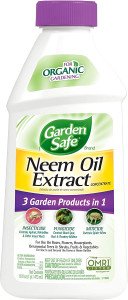
A popular vegetable garden insecticide is a solution based on natural oils. A good example is the Garden Safe HG-93179 Neem Oil Extract Concentrate intended for organic gardening. You can use this product up to the day of harvest on vegetables, fruits, and ornamentals. Clemson University scientists consider products based on neem oil extract to be among the least toxic botanical insecticides. They control spider mites, beetles, aphids, caterpillars, and many more. However, they note that neem oil is most effective against developing immature insects.
Alternatively, you may use pyrethrins, synthetically produced pesticides made from powdered flowers. These products are known to be ones of the safest insecticides as they are of low toxicity to humans and dissipate easily within a day. We recommend Pyrethrin Bonide Garden Insect Spray Concentrate, a cost-efficient solution that controls a broad spectrum of garden insects.
Best Insecticide for Roaches
For more details, read the TOP-16 Best Roach Killers: Poison Baits, Traps, Powders and Sprays.
Cockroaches are notoriously resilient and are hard to kill. Nevertheless, if you take the right approach, you have every chance to succeed. There are three ways to kill roaches with insecticides: spraying chemicals inside or outside the house, applying dusts, and baiting. First, and most importantly, you should never use baits and sprays together. The thing is that sprays that do not kill roaches repel them, decreasing the efficiency of baits.
That said, baits have proved to be the most effective in cockroach control. Famous entomologist Michael F. Potter claims that when used correctly, baits allow homeowners to achieve results comparable to professional extermination. These baits generally come in a bait station and contain slow-acting insecticide so that more cockroaches can be killed.
The Combat Max 12 Month Roach Killing Bait includes 18 bait stations. The containers are child-resistant and safe to use, while the active ingredient, fipronil, is one of the most powerful roach insecticides on the market. Another option is applying gel baits, which work faster and are good for heavy infestations.
If you are dealing with light to moderate infestations, sprays like the Ortho 0220910 Home Defense Insect Killer will do the job. Based on bifenthrin and zeta-cypermethrin, the product provides a long-lasting insect barrier and kills roaches on contact. Apply sprays where cockroaches typically hide or in places with fecal spotting. Do not treat with the insecticide walls, floors, and other exposed areas because cockroaches spend little time there.
As for the dusts, boric acid is the most effective against roaches. Its particles adhere to the insect’s body and kill upon ingestion. We advise the Harris boric acid for roaches which comes in convenient tablets. Dusts are especially useful for treating hard-to-reach spaces like voids where a spray cannot be applied.
Best Lawn Insecticide
The grass is the insects’ favorite shelter because it protects them from sunlight and wind while providing food in abundance. Killing critters in your lawn is a challenging task as this is where your kids and pets play, let alone the fact you should avoid harming beneficial insects and vegetation.
Iowa State University scientists highlight two main approaches in lawn insect control. The first one is using preventive insecticides every year without waiting for the damage to occur. The second approach is to apply curative insecticides when there are signs of infestation. In this regard, timing is very important.
Experts from Michigan State University say that preventive insecticides are the most effective but they work only on small grubs hatched in July. When applied in the spring, these products will not eliminate grubs as they become larger. The scientists recommend preventive insecticides containing imidacloprid, thiamethoxam, and chlorantraniliprole. You may try the Bonide (BND60360) – Insect and Grub Control, a granular insecticide that targets a variety of species including ants, billbugs, fleas, cockroaches, grub, and tick.
As for curative insecticides, they kill grubs at all life stages and should be applied in September or October. The main active ingredients of curative insecticides are carbaryl and trichlorfon. Many products, for example, the Southern Ag 10641 Carbaryl 5% Dust Insecticide, come in powdered form.
Unless you are dealing with a severe infestation, you should treat your lawn with the least toxic solutions such as products based on pyrethrins and spinosad. However, these insecticides will not work against some pest species, according to researchers at the University of California. Spinosad, a natural insecticide containing soil microorganisms, is effective against caterpillars but does not kill grubs. The spinosad-based Monterey LG6150 Garden Insect Spray eliminates different species of caterpillars, moths, fire ants and can be applied to fruits and ornamentals.
Learn more about best lawn insecticides:
- Best Grub Killers 2020: How to Get Rid Of Grubs
- The Best Fungicides for Getting Rid of Powdery Mildew, Snow Mold, Grass and Lawn Fungi
Best Insecticide for Roses
Fragrant blooming roses attract a variety of insects, primarily aphids, rose chafers, rose slugs, and Japanese beetles. It would be a huge mistake to pick the first pesticide you find to spray your roses. First, try botanical control. In addition to being a potent rose fungicide, neem oil is also good at eliminating aphids and spider mites. Another option is insecticidal soaps that work by weakening the insect’s skin, such as the Safer Brand 5118-6 Soap Concentrate. It is worth noting, though, that such products do not work well against thrips.
Chemical insecticides are more potent but should be sprayed when bees are not active. Pyrethrins can be sprayed directly on roses to control aphids and caterpillars while imidacloprid-based products should be applied to the soil around rose bushes. A popular solution is the Bayer Advanced 701110A that combines fungicide tebuconazole and neurotoxic insecticide imidacloprid.
Scientists advise taking advantage of natural enemies of common rose pests. These are parasitic wasps that lay eggs in the bodies of aphids, lacewings feeding on aphids, minute pirate bugs that prey on mites and thrips, and spiders that contribute heavily to biological control. Some of these predators, like 1500 Live Ladybugs, can be purchased online and then released around the plants or mixed with water and sprayed directly on roses.
To learn more about aphid control, read our buyer’s guide “How to Get Rid of Aphids: Top-7 Best Aphid Killers”.
Best Insecticide for Bed Bugs
The most common insecticides used to control bed bugs are pyrethrins and pyrethroids. These products are lethal to bed bugs and are able to flush them out of their shelters. Pyrethrins are natural insecticides derived from chrysanthemum flowers while pyrethroids are synthetic compounds that act in a similar way to pyrethrins. The problem with these types of insecticide is that some bed bug populations have already developed resistance to them. As a result, the bugs are not killed but only move to a new location or temporarily leave their hiding places.
Entomologist Michael Merchant notes that aerosols and foggers are generally ineffective because bed bugs hide in voids and crevices where aerosols cannot reach them. The expert suggests using low-toxic dusts like silica aerogel and diatomaceous earth, with the former being a more effective solution. They work by dehydrating a bug after it comes in contact with the insecticide. According to Merchant, these products are widely used by professional exterminators as a safe yet effective alternative to chemicals.
The Rockwell Labs CXID032 Cimexa Dust is a highly popular insecticide based on silica. Labeled for bed bugs, ticks, cockroaches, fleas, and other pests, it is applied to voids, crevices, mattresses, attics, and other places where these insects hide.
Read our reviews of liquid insecticides for bed bugs in the article “The 14 Best Bed Bug Killer Sprays.”
Best Insecticide for Fleas
Insecticides used in flea control can be loosely divided into two groups: anti-flea pet insecticides and sprays for the treatment of premises. Entomologists say that traditionally these types of insecticides are used in combination. You can opt for topical solutions like the Frontline Plus, a waterproof insecticide that provides a quick knockdown and lasts long. The first active ingredient, fipronil, kills adult fleas while the other one, methoprene, affects their eggs and larvae.
For home flea treatment, apply insecticides made with imidacloprid or permethrin to control adult insects and methoprene insect growth regulators (IGRs) to prevent their eggs and larvae from developing. The Martin’s Permethrin 10% is an economical concentrate intended for both indoor and outdoor use. As for the insect growth regulator, you may want to try the Adams Flea and Tick Home Spray that starts killing flea eggs and larvae in 5 minutes after application.
Thoroughly treat carpets, areas around beds and furniture, paying attention to places where your pets usually spend time. Bug bombs are generally ineffective because they release the insecticide upwards into the air and rarely reach fleas’ hiding places. Insect growth regulators are also highly recommended for yard treatment.
You will learn more about flea control in our article “12 Best Flea Killers: Sprays, Traps, Foggers”.
Best Insecticide for Ants
The biggest mistake homeowners make is to rely solely on sprays. Keep in mind that foragers are just a tiny portion of the colony settled in your home or outside it. Not only do you have to eliminate thousands of other ants but, more importantly, you need to kill the queen. And this is the task that insecticidal baits can successfully cope with.
Ants hide behind furniture, walls, and window frames, where they are hard to detect. Baits attract ants wherever they hide, so there is no need to identify their nest. In addition to a food attractant, baits contain a slow-acting insecticide. The trick is that a forager carries the bait to the nest and feeds it to the queen and other ants. Since the bait does not kill immediately, there is enough time for the poison to be spread throughout the entire colony. Scientists suggest baits made with the following active ingredients: imidacloprid, fipronil, indoxacarb, dinotefuran, and thiamethoxam. The pre-filled TERRO T300B Liquid Ant Bait formulated with a more natural ingredient, Borax, is the most popular product for today.
However, if you have discovered the ant mound, other types of insecticides and active ingredients should be used. Spray the nest with solutions containing bifenthrin, deltamethrin, cyfluthrin, and lambda-cyhalothrin. As a rule, large amounts of liquids are required to treat the mound, which is why it is worth buying a concentrated liquid insecticide for this purpose. Treat the mound thoroughly, so that the insecticide could penetrate into the colony.
Researchers from Colorado State University recommend a perimeter treatment of the house. The thing is that most ants get in the building from outdoors, so creating an insecticide barrier can prevent them from entering the house. You can apply both dusts and sprays, given they are made with pyrethroids like bifenthrin.
For more information, read our comprehensive buyer’s guide “How to Get Rid of Ants: 6 effective strategies and 17 ant control products”.

